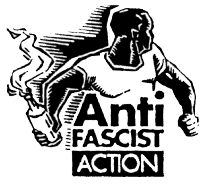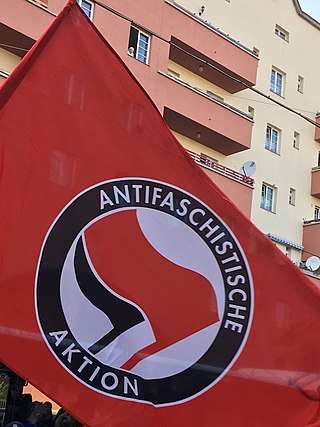Related Research Articles
Searchlight is a British magazine, founded in 1975 by Gerry Gable, which publishes exposés about racism, antisemitism and fascism in the United Kingdom and elsewhere.

The National Front (NF) is a far-right, fascist political party in the United Kingdom. It is currently led by Tony Martin. As a minor party, it has never had its representatives elected to the British or European Parliaments, although it gained a small number of local councillors through defections and it has had a few of its representatives elected to community councils. Founded in 1967, it reached the height of its electoral support during the mid-1970s, when it was briefly England's fourth-largest party in terms of vote share.

Rock Against Communism (RAC) was the name of white power rock concerts in the United Kingdom in the late 1970s and early 1980s, and has since become the catch-all term for music with racist lyrics as well as a specific genre of rock music derived from Oi!. The lyrics can focus on racism and antisemitism, though this depends on the band.
White power skinheads, also known as racist skinheads and neo-Nazi skinheads, are members of a neo-Nazi, white supremacist and antisemitic offshoot of the skinhead subculture. Many of them are affiliated with white nationalist organizations and some of them are members of prison gangs. The movement emerged in the United Kingdom between the late 1960s and the late 1970s, before spreading across Europe, Russia and North America in the 1980–1990s.

The Young Communist League of Canada (YCL-LJC) is a Canadian Marxist–Leninist youth organization founded in 1922. The organization is ideologically aligned with, but organizationally independent from, the Communist Party of Canada. The organization's members played a leading role in the On-to-Ottawa Trek and made up a significant portion of the Mackenzie–Papineau Battalion, which fought on the Republican side in the Spanish Civil War.
The National Assembly Against Racism (NAAR) was a British anti-racist and anti-fascist group.
This is a list of topics related to racism:
Oi! is a subgenre of punk rock that originated in the United Kingdom in the late 1970s. The music and its associated subculture had the goal of bringing together punks, skinheads, and other disaffected working-class youth. The movement was partly a response to the perception that many participants in the early punk rock scene were, in the words of The Business guitarist Steve Kent, "trendy university people using long words, trying to be artistic...and losing touch."

Anti-Fascist Action (AFA) was a militant anti-fascist organisation, founded in the UK in 1985 by a wide range of anti-racist and anti-fascist organisations.

The Battle of Lewisham took place on 13 August 1977, when 500 members of the far-right National Front (NF) attempted to march from New Cross to Lewisham in southeast London and various counter-demonstrations by approximately 4,000 people led to violent clashes between the two groups and between the anti-NF demonstrators and police. 5,000 police officers were present and 56 officers were injured, 11 of whom were hospitalised. 214 people were arrested. Later disturbances in Lewisham town centre saw the first use of police riot shields on the UK mainland.
Maurice Ludmer (1926–1981) was a British anti-fascist activist and journalist. His father was a Salford hairdresser and mother a teacher of Hebrew. His family moved to Birmingham in 1939. As a young man he was interested in sport and joined the Young Communist League. During the Second World War he served in the British Army. It was the shock of a visit to Belsen concentration camp which influenced his life.
Fascism in Africa refers to the phenomenon of fascist parties and movements that were active in Africa.
Alien Kulture was a British punk band active from 1979 through 1981, founded by Ausaf Abbas, Azhar Rana, Pervez Bilgrami, and self-described "token white" Huw Jones. Inspired by the nascent punk scene, the Anti-Nazi League and the Rock Against Racism concert series, and wanting to express the frustrations of second-generation Asian immigrants during a period of ethnic tension and race riots in Britain, the members of the band turned to music to achieve politically what they had not been able to via protest rallies, and to draw on their Pakistani Muslim backgrounds to promote an Asian presence in popular culture. They took their name as a response to then newly elected Prime Minister Margaret Thatcher's stated fears of being "swamped by people with a different culture".
The Anti-Nazi League (ANL) was an organisation set up in 1977 on the initiative of the Socialist Workers Party with sponsorship from some trade unions and the endorsement of a list of prominent people to oppose the rise of far-right groups in the United Kingdom. It was wound down in 1981. It was relaunched in 1992, but merged into Unite Against Fascism in 2003.
Paki is a term typically directed towards people of Pakistani descent mainly in British slang, and as an offensive slur is often used indiscriminately towards people of perceived South Asian descent in general. The slur is used primarily in the United Kingdom, the Benelux and Canada, where the term is commonly associated with "Paki-bashing", which consists of violent attacks against people of perceived Pakistani and South Asian origin.

Post–World War II anti-fascism, including antifa groups, anti-fascist movements and anti-fascist action networks, saw the development of political movements describing themselves as anti-fascist and in opposition to fascism. Those movements have been active in several countries in the aftermath of World War II during the second half of the 20th and early 21st century.
On 16 October 1993, an anti-racism march near Welling in South East London turned violent, leading to large-scale clashes between police and protesters which left around 70 people injured. The march was intending to demand the closure of a bookshop which was the headquarters of the British National Party (BNP).

Opposition to the National Front involved various actions taken against the National Front, a far-right political party in the United Kingdom.
References
- 1 2 3 4 Taj Ali. "'Come What May, We're Here to Stay': Remembering the Asian Youth Movements". Tribune Magazine. Retrieved 11 April 2021.
- 1 2 3 4 James Rippingale (24 November 2018). "Lewisham, London 1977: Notes on fighting fascism". Al Jazeera. Retrieved 11 April 2021.
- 1 2 Erica Buist (29 January 2016). "That's me in the picture: Balwinder Rana at an anti-BNP march in Welling, 1993" . Retrieved 11 April 2021.